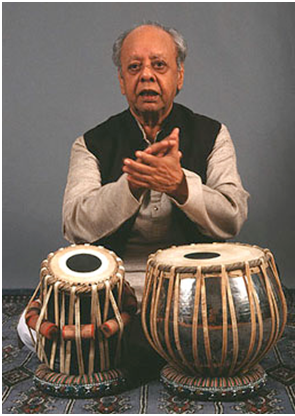Our Guru
USTAD ALLARAKHA
Once in a great while, there emerges a musician who, through his genius, injects that certain spark necessary to elevate an instrument to another level of expression and appreciation. For tabla, Ustad Allarakha was such an artist, having brought his instrument a stature and respect never before enjoyed. A disciple of Mian Kader Baksh, the great guru of the Punjab gharana, Ustad Allarakha was, in his lifetime, the most celebrated exponent of this style. Ustad Allarakha was born in 1919 in Phagwal, a small village in Jammu, the eldest son in a family of seven brothers. From his childhood, it was clear that he was special. Though his family were all soldiers and farmers, his interests lay elsewhere. For hours he would watch the travelling natak company perform their dramas, especially interested in the tabla player performing with the company. At other times, he would sit by the river, seeing a face on the water, and a voice inside him would tell him to seek this man out. This inner voice, at the age of eleven, led him to Lahore where he met the man with the face in his dreams. Mian Kader Baksh then became his guru and began his formal training in the art of tabla playing.

As a performer, Ustad Allarakha was famous for his improvisations, his exceptional qualities of freshness and proportion, and his exquisite tone production effected by a technique which he continued to refine until his death. Moreover, he developed a playing style which is a virtual reference for tabla players of the present generation. He was the recipient of many awards and titles including Padmashree, the Sangeet Natak Akademi Award, the Indo-American Achievement Award, the Maharashtra Gaurav Puraskar and a first-ever gold disc for a classical recording, to name but a few. In 1985, he founded the Ustad Allarakha Institute of Music to train young tabla players in the tradition of the Punjab gharana. He toured worldwide with Zakir, and also in trio with his younger son Fazal Qureshi, until 1996, when he decided to limit his touring to India. For the last four years of his life, he concentrated on teaching and traveled often in India, usually to accept awards and appear at major classical festivals. His rapturous tabla solo performances still in demand, he continued to perform until the end of his life. Ustad Allarakha died on February 3, 2000, truly one of the most pivotal and influential artists to have emerged from India in our time.
